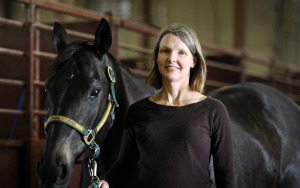
Can interaction with horses hold the key to helping those afflicted with psychological disorders?
Dr. Erika Berg, a professor of animal science at North Dakota State University, is studying the therapeutic benefits of horses.
Dr. Erika Berg received her B.S. and M.S. degrees in Animal Science from Purdue University. She earned her Ph.D. with a focus on equine metabolic pathophysiology from the Division of Animal Sciences at the University of Missouri. Dr. Berg became involved in the field of equine assisted activities and therapies (EAAT) as an undergraduate and has continued to pursue this area of interest throughout her career. Dr. Berg holds her Advanced Level Instructor certification through the Professional Association of Therapeutic Horsemanship International (PATH Intl.) and serves as a PATH Intl. Faculty Evaluator and PATH Intl. State Chair of North Dakota. She is an Associate Professor in the Department of Animal Sciences at North Dakota State University where she oversees the interdisciplinary minor in Therapeutic Horsemanship. Dr. Berg’s developing research program focuses on how horse and human interactions affect both equine and human participants. She is currently investigating the effects of an equine assisted psychotherapy program for at-risk youth in a residential child care facility and evaluating stress behaviors in therapy horses.
Equine Therapy
![]()
Teens in residential child-care facilities often have strong antagonism towards social norms and lack work and study skills. Many have difficulty communicating and use violence to cope. These behaviors are typically the result of abuse or neglect, and traditional therapies often have limited long-term success. Finding therapies that work is imperative because eventually these youth must function in society.
Equine assisted psychotherapy is a non-traditional therapy that engages individuals with horses in a safe environment facilitated by a mental health professional and an equine specialist. During equine assisted psychotherapy sessions, the mental health professional and equine specialist design exercises with the horse that allow the client to problem solve. Because a horse’s survival depends on reading their surroundings, they are keyed in to the body language of other living beings, including people. If you walk up to a horse aggressively, chances are they won’t stick around. From experiences like this, individuals can draw parallels about how they approach people in their life and figure out more positive ways of interacting.
We are collaborating with a residential childcare facility to compare 12 weeks of traditional talk therapy to 12 weeks of equine assisted psychotherapy in adolescents identified as having problematic behaviors, such as aggression, lying and defiance. These youth are at greater risk for anti-social behaviors later in life. Measures include degree of psychopathology, empathy and self-concept. Preliminary evidence indicates the problematic behaviors in the equine assisted therapy group normalized in all areas. For those in 12 weeks of traditional talk therapy, results were less dramatic. Behaviors did not return to normal levels in all areas.
When the study is completed, we hope the results can be used to support the effectiveness of equine therapy to health care providers that do not currently cover it.
Equine-assisted therapy can be expensive due to the costs of maintaining, housing and feeding the horses and those costs need to be justified. Future studies will include long-term assessments.
Read More: NDSU News: Assistant professor studies therapeutic effect of horses


Comments
2 responses to “Erika Berg, North Dakota State University – Equine Therapy”
Hello,
Enjoyed your article, we have been providing equine assisted psychotherapy on an outpatient basis since about 2007, and have seen amazing results, and now have grown in our work providing this therapy modality. We are not inpatient, but weekly sessions provide a benefit for individuals, families, and couples to hep facilitate the healing process without “walls”. We would be interested in your research, as we deliver this service to more and more court-appointed families/individuals, it would be helpful to have that research to support our efforts. And if we can offer any research- I would be interested in obtaining data if you provided/guided me with what tools would be needed.
You might be interested in visiting and seeing these natural horses herds.
http://www.ispmb.org/EquineBehavior.html